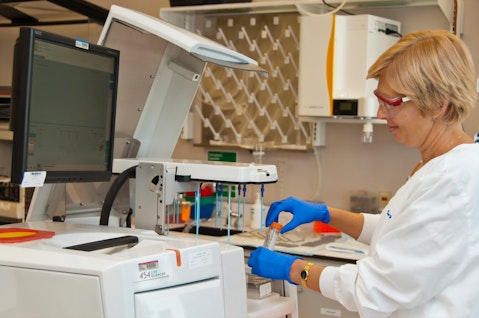In this article, we will take a look at the 11 most undervalued biotech stocks to buy according to hedge funds. To see more such companies, go directly to 5 Most Undervalued Biotech Stocks To Buy According To Hedge Funds.
The rising interest rate environment hammered the biotech industry in 2022. Small biotech companies need a lot of cash for their clinical trials and ambitious R&D budgets. And easy cash becomes elusive when consumers, investors and central banks begin to cut back on spending. The Federal Reserve’s rate-hike spree didn’t bode well for biotech companies in 2022. Healthcare investors funneled most of their cash into large-cap pharmaceutical stocks that are deemed defensive by experts. However, as inflation begins to decline all over the world, some analysts are hopeful that 2023 could be a strong year for biotech companies. There are already signs that the biotech sector is making a comeback. As of February 8, the SPDR S&P Biotech ETF is up 10% year to date, compared to NYSE Arca Pharmaceutical Index which is down 5% year to date.
Bloomberg in a January 2023 report said that biotech executives are facing a lot of scrutiny on cash from investors amid a tough environment. Investors are asking biotech companies about their cash reserves and for how long they are expected to last. The report also talked about the latest mega event of the industry — JPMorgan Healthcare Conference in San Francisco — where biotech executives usually gather to talk about promising pipelines and ambitious projects. But this year, companies spent most of their time reassuring investors that they have enough cash.
Biotech companies were used to easy cash, especially since the pandemic days when governments and VC firms were pouring money into small biotech companies with promising pipelines. Bloomberg cited data from SVB, which shows that VC firms invested a whopping $36.6 billion in biopharma companies in the US, UK and European Union in 2021, which shows a 280% rise from the investments in 2017. The report added that private investments in the sector fell 19% last year on a YoY basis to $29.5 billion.
This difficult situation is also forcing several biotech companies to delay their clinical trials and even IPOs.
However, biotech bulls believe sooner or later the market would turnaround. There are several biotech stocks which are currently undervalued. These companies are working on long-term treatments which could become catalysts for these companies’ stock prices. That’s why in this article we decided to take a look at some biotech stocks that have attractive valuations with strong hedge fund sentiment.

Photo by National Cancer Institute on Unsplash
Our Methodology
For this article we scanned Insider Monkey’s database of 920 hedge funds and picked the most popular biotech stocks among these elite hedge funds that have a PE ratio under 15. This means these are the most undervalued biotech stocks to buy now according to hedge funds.
Most Undervalued Biotech Stocks To Buy According To Hedge Funds
11. SIGA Technologies, Inc. (NASDAQ:SIGA)
Number of Hedge Fund Holders: 15
PE Ratio as of February 8: 5.10
SIGA Technologies, Inc. (NASDAQ:SIGA) is an American biotechnology company known for its antiviral treatment of smallpox, monkeypox, and cowpox. SIGA Technologies, Inc. (NASDAQ:SIGA) ranks 11th in our list of the most undervalued biotechnology stocks to buy according to hedge funds. Insider Monkey’s proprietary database of 920 hedge funds shows that 15 hedge funds had stakes in SIGA Technologies, Inc. (NASDAQ:SIGA) at the end of the third quarter of 2022. The total value of these stakes was $76 million. The biggest stakeholder of SIGA Technologies, Inc. (NASDAQ:SIGA) was Jim Simons’ Renaissance Technologies which owns a $24 million stake in the company.
10. Avid Bioservices, Inc. (NASDAQ:CDMO)
Number of Hedge Fund Holders: 15
PE Ratio as of February 8: 13.16
Avid Bioservices, Inc. (NASDAQ:CDMO) has gained about 28% year to date as of February 8. Avid Bioservices, Inc. (NASDAQ:CDMO)’s PE ratio remains under 15. However, Avid Bioservices, Inc. (NASDAQ:CDMO) recently reported weak quarterly results. Avid Bioservices, Inc. (NASDAQ:CDMO) revised its full-year revenue guidance to $145 million and $150 million from $140 million to $145 million. The analyst consensus estimate for this metric is $143.81 million. After the quarterly results, Craig-Hallum analyst Matt Hewitt kept a Buy rating on Avid Bioservices, Inc. (NASDAQ:CDMO) but lowered the price target to $25 from $30.
As of the end of the third quarter of 2022, 15 hedge funds reported owning shares in Avid Bioservices, Inc. (NASDAQ:CDMO), according to Insider Monkey’s database of 920 hedge fund holdings. The total worth of these stakes was about $99 million.
Here is what Laughing Water Capital has to say about Avid Bioservices, Inc. (NASDAQ:CDMO) in its Q2 2022 investor letter:
“How Cheap is Cheap Enough?
Consider the case of Avid Bioservices (NASDAQ:CDMO), a large molecule, small batch Contract Drug Manufacturing Organization that will be familiar to all but our newest partners, as we owned shares from 1H 2018 until all but exiting our position in the low $30s in Q4 of 2021. Since that time, shares have declined precipitously as the company is both a “growth” stock and in the S&P Biotech ETF (XBI), which has declined ~36% YTD to quarter end. However, in my view Avid Bio is a baby with the bathwater, and we once again made Avid Bioservices a large position during the quarter.
First, unlike most “growth” stocks, Avid Bioservices is not a “disruptor.” You don’t have to make any blind assumptions about total addressable market (TAM), customer acquisition costs (CAC), or churn. There is very little risk of “garbage in, garbage out” when modeling Avid’s future. Rather, Avid’s assumed growth is tied to building additional manufacturing capacity. In my view, it is a much easier task to understand the dynamics of building an additional manufacturing facility than it is to understand the dynamics of alleged TAM, potential CAC, and unknown churn.
Second, unlike most biotech stocks, Avid is a real business, not a binary bet on whether or not a drug will meet its hoped-for end state. Lastly, and most importantly, Avid Bio has one characteristic that staunchly separates it from other high flying growth stocks and biotech stocks that have been punished by the market: it is set to gush cash in the not-too-distant future.”
9. BioNTech SE (NASDAQ:BNTX)
Number of Hedge Fund Holders: 18
PE Ratio as of February 8: 3.25
BioNTech SE (NASDAQ:BNTX) is a notable vaccine maker which gained fame after the company made a successful COVID-19 vaccine with Pfizer. Recently, it was reported that the EU was mulling the possibility of reducing COVID vaccine shipments from BioNTech SE (NASDAQ:BNTX) and Pfizer. Last month, the FDA said that it has not observed an increased stroke risk linked to Pfizer/ BioNTech SE (NASDAQ:BNTX) vaccine’s updated COVID shots in seniors.
At the end of the September quarter of 2022, 18 hedge funds in Insider Monkey’s database of 920 funds reported owning stakes in BioNTech SE (NASDAQ:BNTX). The biggest stakeholder of BioNTech SE (NASDAQ:BNTX) was Philippe Laffont’s Coatue Management which has a $57 million stake in the company.
Artisan Partners made the following comment about BioNTech SE (NASDAQ:BNTX) in its Q3 2022 investor letter:
“BioNTech SE (NASDAQ:BNTX) is a leading biotech company focused on developing immunotherapies to treat cancer and other serious diseases. Over the past year, we trimmed our position significantly as we believed the stock’s valuation failed to reflect the windfall nature of COVID-19 vaccine cash flows. With the stock nearly 70% off its highs and, more importantly, at a reasonable discount to our PMV estimate, we view the valuation as opportunistic given its long-term profit cycle potential. BioNTech’s intellectual property in mRNA, and COVID funded manufacturing capacity leave it well-positioned to develop new mRNA vaccines and cancer therapies. In addition, the company has non-mRNA technology (e.g., cell therapy assets) and blue-chip partnerships offering additional optionality. While the company’s R&D pipeline beyond COVID-19 vaccines will take some time to mature, it is well funded by close to $20 billion in COVID-vaccine proceeds. We increased our position within the GardenSM as the stock declined.”
8. Vir Biotechnology, Inc. (NASDAQ:VIR)
Number of Hedge Fund Holders: 18
PE Ratio as of February 8: 3.46
Vir Biotechnology, Inc. (NASDAQ:VIR) ranks 8th in our list of the most undervalued biotech stocks to buy according to hedge funds. Vir Biotechnology, Inc. (NASDAQ:VIR) has gained about 18% year to date as of February 8. Recently, Morgan Stanley upgraded the stock to Equal Weight from Underweight. Vir Biotechnology, Inc. (NASDAQ:VIR) cited multiple Phase 2 products in the company’s pipeline for microbial diseases for the bullish rating. Morgan Stanley’s analyst Michael Ulz said in a note that his previous bearish take on Vir Biotechnology, Inc. (NASDAQ:VIR) was based on long-term outlook for its COVID vaccine and sotrovimab. However, the analyst is now bullish on Vir Biotechnology, Inc. (NASDAQ:VIR) thanks to its infectious disease pipeline, which includes Flu (influenza) and hepatitis B (HBV).
A total of 18 hedge funds in Insider Monkey’s database of elite hedge funds’ holdings reported owning shares of Vir Biotechnology, Inc. (NASDAQ:VIR) at the end of the September quarter.
7. Maravai LifeSciences Holdings, Inc. (NASDAQ:MRVI)
Number of Hedge Fund Holders: 20
PE Ratio as of February 8: 6.19
Maravai LifeSciences Holdings, Inc. (NASDAQ:MRVI) is a California-based biotech firm that makes drug therapies and vaccines. Maravai LifeSciences Holdings, Inc. (NASDAQ:MRVI)’s PE ratio stands at 6.19 as of February 8. On a year-to-date basis, Maravai LifeSciences Holdings, Inc. (NASDAQ:MRVI) has gained about 6%. However, Maravai LifeSciences Holdings, Inc. (NASDAQ:MRVI) recently received more than one analyst downgrade. UBS analyst John Sourbeer recently downgraded Maravai LifeSciences Holdings, Inc. (NASDAQ:MRVI) citing lack of short-term catalysts. However, the analyst said that he remains positive on Maravai LifeSciences Holdings, Inc. (NASDAQ:MRVI)’s long-term value proposition.
A total of 20 hedge funds tracked by Insider Monkey reported owning Maravai LifeSciences Holdings, Inc. (NASDAQ:MRVI) shares as of the end of the third quarter of last year. The net worth of these stakes was about $753 million. The biggest stakeholder of Maravai LifeSciences Holdings, Inc. (NASDAQ:MRVI) was Robert Joseph Caruso’s Select Equity Group which owns a $420 million stake as of the end of the September quarter.
6. Innoviva, Inc. (NASDAQ:INVA)
Number of Hedge Fund Holders: 20
PE Ratio as of February 8: 3.96
Innoviva, Inc. (NASDAQ:INVA) ranks 6th in our list of the most undervalued biotech stocks to buy according to hedge funds. In December, the US FDA granted priority review to Innoviva, Inc. (NASDAQ:INVA)’s application for the approval of the treatment of infections caused by Acinetobacter baumannii-calcoaceticus complex (ABC), including multi-drug resistant and carbapenem-resistant strains. A decision on the application is expected in May this year. In the third quarter, Innoviva, Inc. (NASDAQ:INVA)’s revenue fell by 31% on a YoY basis to come in at $67.26 million. GAAP EPS in the period came in at $2.80.
A total of 20 hedge funds tracked by Insider Monkey reported owning stakes in Innoviva, Inc. (NASDAQ:INVA) at the end of the third quarter of 2022. The biggest stakeholder of Innoviva, Inc. (NASDAQ:INVA) during this period was Alex Denner’s Sarissa Capital Management which owns a $77 million stake in the company.
Click to continue reading and see 5 Most Undervalued Biotech Stocks To Buy According To Hedge Funds.
Suggested articles:
- Buffett Stock Portfolio: Recent Buys
- 25 Fastest Cars in the World
- 15 Most Undervalued Small-Cap Stocks To Buy
Disclosure: None. 11 Most Undervalued Biotech Stocks To Buy According To Hedge Funds is originally published on Insider Monkey.




